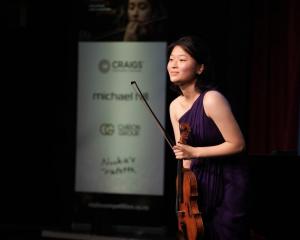
Jonny Love (yes, his real name) can still recall the Dunedin flats in which he penned the songs that have made it on to his self-titled debut album.
A George St abode was home to one and Castle St, scarfie central, the catalyst for at least another two.
Love moved to Auckland in 2006, having completed a double degree in contemporary music and marketing at the University of Otago.
He still has reminders of his old haunts - he now lives in a Remuera flat with a couple of mates from Dunedin - but you get the feeling he prefers to look forward rather than back.
When Love writes of the importance of backing oneself, as he does on his first two singles, Not the First (Not The Last) and My Sympathy, he means it.
The path he has walked since he left England in 2002 at the age of 19 is proof of the power of self-belief.
Love, son of a Kiwi father and English mother, was first attracted to New Zealand because of its rugby.
Having played for British club Harlequins, he had hopes of a high-level sporting career.
However, recurring injuries prompted a reassessment of his future.
Wise advice from his dad also helped, he admits.
"When I was in Otago, I started playing in a couple of bands and at the same time my rugby career was declining, my music career was really taking off.
"I've got dodgy hamstrings. They just tear all the time. I've seen all the best people in New Zealand and England, trying to fix it, but to no avail . . .
"Then when the music started taking off, well you can't really go out every Saturday and get your hands stamped on and expect to play that night," Love explains via telephone from Auckland a few days before the release this week of his 11-song album.
"After the first year I went back to the United Kingdom because my parents were still living there and I was playing for Harlequins.
They offered me a contract to stay, which would have meant giving up my university career in New "Zealand, and my dad just sat me down and said, 'Look, I know this is what you want to do but your body is just not cut out for it; you should go and finish what you're doing over there, try and get into the Highlanders instead and just see what happens'.
"It was the best call I've ever made because I came back and couldn't get fit. I played around a lot in Dunedin, just doing covers, and that paid my way through university. I really kicked into gear with my own stuff when I moved to Auckland, which was about two years ago."
Love knew very few people in Auckland.
He stayed with a friend's family for four months, held down a part-time job and went to as many open-mic and jam nights as he could.
Eventually, he met singer Jason Kerrison, of Opshop, and joined Kerrison's covers band project, the Corporate Voice Experience.
Love is still a member. In fact, like Kerrison and Opshop guitarist Matt Treacy, he relies on the outfit for a regular income.
Love also set up his own record label, Limelight Records, as a means of releasing his own album following interest in Not the First (Not The Last), which was picked up by More FM late last year and received a NZ On Air video grant ($5000) as well as retrospective funding ($5000) as part of the organisation's "Radio Hits" programme.
"I thought, 'Right, I've got to have something to back this up with', and decided to take a risk and fund the album myself . . . It's a massive risk because if the album doesn't do well then I've got to pay it off, but if you can't take a risk on yourself, who can you take a risk on?"
That initial punt has had a result: Love has signed to major label Warner Music.
"It was such a good offer I just couldn't say no," he says, adding he retains the rights for his music through his Limelight label.
As for the album, it is a big-sounding affair, despite Love and producer Greg Haver (Manic Street Preachers, Feelers, Opshop) having to be a "bit careful with the budget" at Auckland's York St Studios.
Haver played drums, Opshop's Clint Harris was on bass and Love provided vocals, guitars, piano and glockenspiel.
Despite writing all his material on an acoustic guitar, Love was keen to avoid a stripped-back, mellow approach.
He wanted something a little more "epic"; hence the use of a string quartet on eight of the 11 tracks.
"One of my big influences is a band called Sigur Ros. I said to Greg, 'Right, no holds barred; let's try to create something special and just see where it takes us'."
Regardless of the grandiose ethic, there is a downbeat, melancholy feel to the album, a result, Love says, of his British background.
"I'm really influenced by Coldplay, Radiohead, Bloc Party and other bands as well, like Death Cab for Cutie. They are all melancholy bands."
There are plans afoot for a national tour to promote the album in November-December.
A week-long NZ On Air tour to regional radio stations is also booked.
In the meantime, Love is navigating another learning curve.
The media awaits.
"It's completely new to me. It's been OK so far. The one thing I've had to learn is you don't get second chances so you try not to say something too stupid.
"In a way, I can't believe it's real. I've got the apprehensive part of it, like all the reviews coming in. People are going to start having opinions on it.
"When you put music out there you really are baring your soul a bit, so you've got to steel yourself that some people may not like it."












